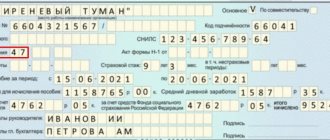Definition of a will
A will is a document certified by a notary and defining the procedure and principles for the distribution of property after the death of the testator. A will is drawn up during one’s lifetime; it specifies how and by which people property, existing rights and debts will be shared. In the presence of this document, inheritance by law does not apply, the order of priority will not be observed.
The will comes into force only after the death of the testator. During his lifetime, none of the persons indicated in the document has the right to claim a share in the inheritance. This is one of the differences between a will and an annuity.
Several wills
A person can make an unlimited number of wills during his life, and this does not contradict current laws.
At the same time, an important rule remains in force - when a new document changes the will, the instructions prescribed in the previous will, then the legal force is recognized in the latest version.
Therefore, if the testator said that he indicated you in the will, it is possible that another document will be drawn up, in which there will be completely different surnames.
If the testator made two different wills on the same day, then court proceedings are inevitable. The heirs will have to prove which of the documents was drawn up at least 1 minute later.
Features, types and power of a will
A will has greater legal force: if it is drawn up without violations, then the principle of priority will not apply. A document certified by a notary and signed by the testator can become the reason for the transfer of ownership to anyone, even someone who is not a relative. This is the main thing about receiving an inheritance by will from inheritance by law.
A will allows you to do the following:
- Transfer the property to the stepson, and not to the natural son.
- Bequeath an apartment in the city center to a close friend, even if there are only relatives.
- Hide your will regarding inheritance from everyone. In certain situations, the testator may draw up a closed will, the essence of which even the notary will not know.
It is important that the closed will be drawn up correctly, does not contain ambiguous phrases, and is written by hand (printing on a printer is prohibited). The document is brought to the notary, who, in the presence of two witnesses, seals it in two envelopes and puts it away for storage. The envelopes are opened after the death of the testator. If it turns out that the document was drawn up incorrectly, the property will be inherited by law.
A will allows you to transfer even personal savings in a bank deposit to a stranger. Moreover, to draw up such a document you do not even need to go to a notary; it is enough to draw up a testamentary disposition in the bank department and have it certified by an employee of the financial institution. At any time, the owner of the deposit can change the contents of the document or cancel it; the amount can be distributed among several persons, specifying the size of their shares. A testamentary disposition is drawn up directly at the bank and applies only to funds deposited into an account at this institution.
You can draw up a testamentary disclaimer - a document transferring real estate to a specific heir, but only if he meets a certain condition. For example, Andrei’s mother lives in her house, who once renounced her share of the inheritance in favor of her son. He can draw up a will, according to which after death the house becomes the property of the daughter, but the mother will live in it until death. The testamentary refusal is not canceled even after a change of owner under the purchase and sale agreement: the new owners will be required to provide a house for Andrei’s mother to live in.
Another type of will is a testamentary assignment. This document obliges the heir to perform a generally useful action: for example, plant a flowerbed, educate orphans, plant a tree in front of the house. Inheritance of property is possible only if the actions specified by the testator are performed. Moreover, he has the right not to identify the person who will perform the specified action.
The procedure for registering an inheritance under a will
Next, we suggest you figure out whether you need to enter into an inheritance if there is a will. The fact is that, according to Art. 1152 of the Civil Code, in order to acquire an inheritance, it must be accepted.
In accordance with Art. 1153 of the Civil Code, the law provides for two methods of accepting an inheritance mass:
- submitting a corresponding application to a notary office;
- actual possession of the hereditary property: moving in, repairs, changing locks, paying debts.
Considering that Ch. 64 of the Civil Code defines the procedure for entering into an inheritance by will; you will have to enter into an inheritance in any case, both by will and by law. Even in the case of actual acceptance of property, it is impossible to do without contacting a notary and obtaining a certificate confirming inheritance rights.
Since notarization is the most common way of accepting an inheritance, we will figure out step by step what to do with the will after the death of the testator:
- Visit a notary with an application, the type of which the heir chooses himself: about entering into an inheritance or about issuing a certificate of the right to inheritance. The application must be submitted at the place where the estate was opened - the last place of residence at the time of death, and if it is unknown or is not in Russia - at the location of the property.
An application for inheritance under a will after the death of a relative must contain:- personal data of the testator, his last known address of residence;
date of his death, death certificate number;
- the applicant’s direct desire to inherit;
- reference to a will as a basis for inheritance;
- information about other heirs, location of property, and so on;
- date of filing.
- You will not need any documents other than a passport when contacting a notary. He will accept the application and explain what list of documents needs to be presented at the next meeting.
- Assess the value of the inheritance mass. This is done by private appraisers and appraisal organizations. An assessment will be required for a fair division of the inheritance between successors, as well as for calculating the amount of the notary fee.
- The process of entering into an inheritance after the death of a relative involves paying a state fee in favor of a notary. We will describe in more detail the size and procedure for its calculation below.
- The notary will prepare and issue a certificate, which is the only confirmation of the successor’s inheritance rights.
- The final step of the newly-minted heirs should be the re-registration of the property subject to registration into ownership.
The application can be submitted by the heirs in person, sent by mail or transmitted through a representative.
Since most of these points have characteristic features, we propose to consider the most important of them in more detail.
Package of documents
When contacting a notary office for the first time, successors will only need an application and a passport. The list of documents that will be required in the future should be clarified with the notary himself.
Based on the logic of Art. 73 “Fundamentals of the legislation of the Russian Federation on notaries” and paragraph 14 of section. IX Methodological Recommendations for Registration of Inheritance Rights, such a list should include documents confirming:
- fact and moment of death, time and place of opening of inheritance - death certificate;
- the basis of inheritance is a will;
- composition and location of the inheritance;
- whether the testator has ownership rights to the specified property: an extract from the Unified State Register of Real Estate, purchase and sale agreements, statements of accounts of the deceased, an inventory of movable property, and so on;
- carrying out assessment activities - assessment report;
- payment of state duty.
If the documents necessary for entering into inheritance under a will cannot be presented to the notary, he must explain to the heirs the prospects for resolving the issue in court. The article “Documents for entering into an inheritance” will help you learn more about this.
State duty
Payment of state duty is a mandatory condition for registering an inheritance. The amount of payment is determined by paragraphs. 22 clause 1 art. 333.24 of the Tax Code and does not depend on the basis on which the inheritance occurs. Thus, the state duty on inheritance under a will in Russia in 2021 is charged in the amount of:
- 0.3% of the estimated value of inherited things, but not more than 100 thousand rubles, if the successors are spouses, children, parents, and brothers and sisters;
- 0.6% of the estimated value of inherited things, but not more than 1 million rubles for all other legal successors.
It is levied on everyone who receives their share of the property. At the same time, according to Art. 333.38 Tax Code, the following are exempt from paying the fee:
- government agencies and local governments;
- public organizations of disabled people;
- heirs, if they inherit: real estate in which they lived together with the deceased and continue to live there;
- for relatives who died in the performance of official duties, civic duty or from political repression;
- bank deposits, author's rights, remuneration, pensions.
The article “State Duty on Inheritance” will tell you more about this.
Inheritance tax
According to the legislation in force until 2006, inheritance was recognized as taxable income. A lot has changed since then. Today, according to paragraphs. 18 clause 1 art. 217 of the Tax Code, any income received within the framework of the inheritance mass is considered not subject to taxation.
Two exceptions are remunerations that are paid to the successors of the creators:
- literary works and works of art;
- inventions, industrial designs, discoveries.
However, upon entering into an inheritance, the heir assumes all responsibilities for paying taxes on certain types of property.
Having become the full owner of certain things, the heir will no longer be perceived as a gratuitous recipient, and therefore is forced to pay taxes: land, transport and real estate taxes.
Registration of property rights
To fully take possession of certain types of inherited property, a certificate of inheritance rights alone is not enough.
This applies to cases where the transfer of ownership requires its re-registration to the new owner. We are talking, in particular, about acquiring as an inheritance:
- real estate - apartments, houses, land plots, dorm rooms, garages, dachas and so on. According to Art. 131 of the Civil Code, ownership of real estate and its transfer are subject to mandatory state registration. The rules for its implementation are determined by the Federal Law “On State Registration of Real Estate”, according to which it is carried out by Rosreestr.
- vehicles - cars, motorcycles, special equipment and so on. According to the Procedure for registration of vehicles, approved by Order of the Ministry of Internal Affairs No. 1001 dated November 24, 2008, re-registration must be done within 10 days from the date of purchase by contacting the nearest traffic police department at your place of residence.
- shares of a joint stock company - only after the heir is entered into the register of shareholders will he become a full owner of the shares and a shareholder. It is not enough to simply own documents confirming the rights to shares; registration is required to participate in management and receive dividends.
Next, we suggest you figure out when you can enter into an inheritance under a will.

Will and inheritance: what is the difference
There is a big difference between receiving property by will and inheriting by law. In the first case, the owner can, at his own discretion, distribute the property among any people, taking into account his wishes or sympathies. After his death, an apartment, a car, or certain items may go to acquaintances, close friends, or beloved children.
Inheritance by law implies the transfer of rights to property between relatives of the same line in certain shares. The principle applies if the owner did not make a will. In this case, the property goes to the relatives of the deceased; if there are no such in one line, the right to receive the inheritance will pass to the heirs of the next line.
When trying to understand what is better: a will or an inheritance by law, you need to take into account the owner’s attitude towards loved ones. If he doesn’t care who gets the acquired property after death, then he doesn’t have to do anything: the inheritance will be divided according to the law. If you want to somehow thank a loved one by giving them a house or a car, it is better to make a will.
Registration cost
The cost of entering into an inheritance after the death of a relative does not depend on the grounds on which the successors are called upon to inherit. Both in inheritance by law and in the presence of a will, the amount of expenses depends on:
- total amount of payments,
- volume and value of the inheritance mass,
- number of required payments,
- other features of the situation.
The heir's expenses are not limited by the state duty. To accurately determine how much it costs to inherit under a will, you need to know the exact amount of expenses for:
- payment for legal and technical services - production and request of necessary documents, photocopying, and so on;
- payment of state fees in case of inheritance in court - when reinstating missed deadlines, appealing a refusal by a notary;
- appraisal by a private appraiser;
- payment of state fees for the protection of inheritance and performance of other notarial actions;
- state registration of transfer of rights.
The article “How much does it cost to enter into an inheritance from a notary” will help you learn more about the costs of registration.
How to make a will for inheritance
A will is written by hand or typed on a computer; only a closed will cannot be printed on a printer. There are no requirements for the wording, forms and style of presentation used. However, it is important to formulate thoughts clearly so that there are no ambiguities in the future.
Where to get a sample will for inheritance
In 2021, it is not difficult to obtain a sample will for an inheritance: different versions can be downloaded on legal websites, in file hosting services and on some forums. The person will only have to rewrite the information, changing certain data to his own. It seems simple, but it's actually not the best option.
When reading the will, the notary will interpret the wording literally. When drawing up a will based on a sample, there is a risk of unwittingly rewriting certain terms that will incorrectly reflect the wishes. As a result, it is possible not to deprive someone of an inheritance, but to draw up, for example, a testamentary refusal.
The will must indicate:
- date and place of compilation;
- testator's data;
- wording indicating that the compiler is of sound mind and his voluntary action;
- the essence of the will, what is transferred and under what conditions;
- data of the heir or heirs.
If difficulties arise when drawing up a will, it is better to seek help from our lawyers. They will help you draw up the document correctly, which will make life easier for the heirs in the future.
Who can make a will
There are a number of requirements for the testator that are established by current legislation:
- the age of majority of the testator;
- existence of the right to property;
- the ability to be accountable for one’s actions;
- making a will of your own free will, not under duress;
- personal delivery of the document to the notary.
Violation of these requirements will lead to the will being declared invalid and the property will be inherited by law.
Step-by-step instructions for making a will
If you don’t know how to write a will for an inheritance, have no idea where to start and where you can draw up this document, follow our instructions:
- Determine the property transferred under the will. Remember that you can transfer emerging rights, as well as debts. At the same stage, you can appoint an executor - a person who will deal with the issues of preserving the property and executing the will.
- Decide on heirs. Indicate who they are to the testator. If these are relatives, then indicate the degree of relationship.
- Settle one's affairs. This can be done at a notary or at home, and then bring the document to him for certification.
The notary will check the passport, the contents of the document, the presence of the testator’s signature, then put his stamp and signature. An inheritance will is drawn up in two copies, one remains with the notary, and the testator takes the second with him.
If you do not know how to write a will for an inheritance and are afraid of making mistakes, contact our lawyers. They will draw up a document taking into account your wishes, help you understand the terminology and avoid incorrect wording.
How to cancel a will for inheritance during your lifetime
The testator has the right to cancel or change the will drawn up at any time, without the consent of other persons and without indicating the reasons for his decision. To do this, you can go one of two ways: write a new will or draw up an order to revoke the will. The first option is usually used if the content of the document needs to be changed.
An order to revoke a will is drawn up on the same principle as the will itself. A document can be certified by any notary, regardless of the current location of the testator or the location of the objects being inherited.
| Services of lawyers and advocates | Price |
| Initial free consultation (up to 30 minutes) | FOR FREE |
| Consultation in writing | from 2000 rub |
| Drawing up an application for a court order | from 1000 rub |
| Drawing up the necessary documents: claims, complaints, requests | from 3000 rub |
| Representation in court | from 5000 rub |
| Turnkey legal protection: from claim to victory | from 15,000 rub. |
| Appeal, defense in a higher authority | from 3000 rub |
| Assistance in the execution of a court decision | from 3000 rub |
Can a will be contested?
After the death of the testator, not everyone is satisfied with his will, and therefore the question may arise of how to contest a will for inheritance in the Russian Federation. This is difficult to do: you will need to prove that the will is void. The reason for this could be different facts:
- The document is not certified by a notary.
- There is evidence that the testator acted under pressure or was in a state of alcoholic (drug) intoxication.
- The testator could not have been of sound mind, for example, due to taking psychotropic drugs or illness.
To challenge a will, you first need to consult with a lawyer, then go to court. There is no other option in this case.
There are many controversial issues regarding the making or revoking of a will. Contact our lawyers to get advice, draw up a document correctly or understand how you can challenge it.
0 0 vote
Article rating
Registration deadlines
The deadlines for registration of inheritance rights are determined by Art. 1154 Civil Code. The provisions of the article allow heirs to accept an inheritance within six months from the moment of the death of a relative, recognition of him as deceased, or the emergence of the right to such inheritance in the event of refusal or removal of the heirs.
Missing a deadline does not deprive the heir of the rights to inheritance - if other heirs agree, by virtue of Art. 1155 of the Civil Code, the inheritance share can be accepted after the specified period.
This will require the notarized consent of each of the successors.
If there is no such consent, it will not be possible to restore the terms of inheritance under a will through a notary - you will have to go to court. But it is necessary to take into account that:
- the court will restore the term only if the called successor did not know about the opening of the inheritance or other valid reasons prevented the application to the notary;
- You can go to court to restore the missed deadline within six months from the moment when valid reasons no longer exist.
The article “Date of Inheritance” will help you learn more about this.







